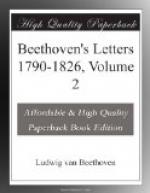My beloved friend, excuse my writing more to-day, for the remembrance of the past has deeply affected me, and not without many tears have I written this letter. The oftener you write the more pleasure will you confer on me. There can be no question on either side as to our friendship, so farewell. I beg you will embrace your dear children and your Lorchen in my name, and think of me when you do so. May God be with you all.
As ever, your attached friend, with sincere esteem,
BEETHOVEN.
[Footnote 1: On which account this letter is dictated, and only signed by Beethoven, who was at that time at his brother’s house in the country—Gneixendorf, near Krems, on the Danube.]
[Footnote 2: In consequence of his application to the King of Prussia to subscribe to his Mass, of which he had sent the MS., Beethoven received the following intimation:—
To the Composer Ludwig van Beethoven.
Berlin, Nov. 25, 1826.
“It gave me great pleasure to receive your new work, knowing the acknowledged value of your compositions. I thank you for having sent it to me, and present you with a ring of brilliants, as a token of my sincere appreciation.
“FRIEDRICH WILHELM.”
Schindler adds that the stones in the ring were false, and casts a suspicion of fraud on the Chancery Director of that day, W——.]
[Footnote 3: It was during those weeks that he wrote the second Finale to the B. flat major Quartet, Op. 130, little anticipating that this was to be his “Swan song.”]
460.
TO TOBIAS HASLINGER.[1]




